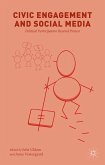The present work examines the role of networks of civic engagement on trust in Albania based on Robert Putnam theory of social capital. Trust is one of the main elements of social capital and it is considered to be one of the most productive elements, inasmuch as the positive effects, it has throughout the society. This study is interesting because helps to understand the impact of networks of civic engagement on trust and social benefits that follow like democratic governance, contribution to the political support of the government, social cohesion, reduction of transaction costs, increased health and even economic prosperity. To measure participation in networks of civic engagement and trust is used the data set of World Bank, Living Standard Measurement Survey carried by Albanian National Institute of Statistics. This work aims to contribute to the study of social capital and trust in the Albanian society and is directed to scholars, students and all individuals interested in this topic.
Bitte wählen Sie Ihr Anliegen aus.
Rechnungen
Retourenschein anfordern
Bestellstatus
Storno








